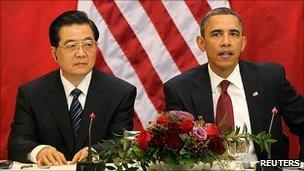China US relations: 'China is changing'
- Published

Divisions have dogged US-China relations over the past two years
Chinese President Hu Jintao has met leading US politicians in Washington and heard their concerns over a number of issues between the two nations.
Mr Hu also acknowledged that "a lot still needs to be done" in China over human rights.
Analysts say Mr Hu's visit is the most important by a Chinese leader in 30 years given China's growing military, economic and diplomatic clout.
Chinese people around the world share their views on the importance of the state visit.
Hu Zeyuan, Hangzhou, China
I feel reassured when I see Chinese and US leaders holding friendly talks, because it shows both leaders are being responsible to their nations and to the world as a whole.
In the past few months I have been worried about China-US relations, because of the tension between the US and North Korea.
I think the world needs to see how much China has changed, and the role it has played in easing tensions in the Korean Peninsula.
The Chinese people can see that China and the US have common interests and they are willing to work at the relationship.
China is a big country with limited resources and an underdeveloped system of government, it is understandable that we have some human rights problems.
President Hu's attitude shows the world that the Chinese people are willing to face their own problems honestly and are willing to improve the situation.
I think the solution lies in development - generally the more developed the economy is, the better human rights situation is.
As for the claims that China is deliberately manipulating its currency, I think Western countries should send journalists to China to see how ordinary families are living - they are not rich, they are living frugally and are saving money.
It's not fair to pressure China to increase the value of the yuan.
Sarah Yang, Beijing, China
I do not think the relationship between the people of these two fantastic countries should always depend on politics.
Every Chinese individual is affected by the culture and ideas of US. Nobody could deny this.
Their Hollywood blockbusters, food, new technology... all of these to a large extent develop our living standards (of course other developed countries also help a lot in this aspect.)
But interaction on the economic and cultural fields should be more frequent.
Unfortunately, a series of barriers and misunderstandings are still common, not only in the so-called mainstream media, but also stubbornly in some people.
China is a very friendly and peaceful nation. But for historical reasons, many Chinese people, especially elderly people, are used to believing the government without question.
It is quite understandable that with the media under the control of the government, many people just believe what they see on the TV and in newspapers.
If this doesn't change in the future, by which I mean more media freedom and a priority on human rights, it will be very hard for Chinese people to really open their minds to the world and welcome more unfamiliar ideas.
If more freedom is given and there was more honesty, we would live a more comfortable and normal life and start looking at the world in a more rational way.
Then, naturally, the relationship between China and US, and between China and other developed countries will improve.Sarah Yang, Beijing, China
David Zhang, Beijing, China (currently in London, UK)

David Zhang says the US needs to treat China with greater respect
I am working in London but am originally from Beijing.
When the White House is still pressurising China to do better job in all sorts of areas, it is clear to me that not much progress could come from this formal visit.
The most important thing for Americans to do is to stop being arrogant and talk with their counterparts from China on a basis of mutual respect.
America's claims that China is manipulating its currency are hypocritical. At the moment, the US is manipulating its own currency by pouring $600bn into the market, which causes the dollar to depreciate heavily.
America is the world's dominant economic superpower - countries like China and Japan are forced to lend to the US to prop up its economy.
If the US economy collapses it will have a knock-on effect on the global economy.
In my opinion, the world economy would benefit from additional superpowers emerging to compete with the US.
The US is also sending three fleets with aircraft carriers to the Yellow Sea, at the front door of China.
China is the one being pushed to a corner, not the US, but clearly Americans want the world to believe that China is causing all sorts of problems - from international trading surplus and currency manipulation to military threat.
Huang, Chongqing, China
In China we define human rights differently to the West. Our system for human rights has just started to take shape, so it is neither sophisticated or robust yet, despite this, life is improving for ordinary people.
We are already enjoying better welfare and greater life expectancy.
Chongqing, where I come from, has witnessed unprecedented growth, so if you stopped a local here and asked him or her whether they have human rights, I think they would say yes.
I walk through the streets and I see that people are happy. They can go to five-star hotels now and see Hollywood movies - ten years ago we didn't have that right.
To us, human rights are about welfare and the right to not live in poverty. The rights to criticise the authorities and organise protests are less important.
It is possible to speak out, even though we are a one party state. On our social networking site Ren Ren, the most popular site for universities, people do criticise human rights abuses.
I admit there are still difficulties to overcome, for example, bribes are common in our society and sometimes you have to pay to be promoted at work.
We want to purge our society of corruption, but no country in the world is free from corruption.
China is changing and I am very hopeful about the visit by President Hu Jintao to the United States. He is different to our previous leaders - more considerate and down to earth.
When there was an earthquake in Sichuan in 2008, he was at the site in hours and that meant a lot to ordinary people.
Comments e-mailed to the BBC
Muman Hu and Mr Wen have admitted that there's still much to be done to improve human rights in China in the USA, but they never publicly mentioned this to their own people inside China. This, frankly speaking, is ironic. We have indeed improved a lot in human rights, but things don't change fundamentally. We have all the rights on paper, but not in reality. I hope that the CCP will take solid steps to improve human rights in China in the near future. Ben, China
I think the words spoken by the Chinese premier show signs of a change. His words are very positive and progressive. Though human rights can be described in ways such as food, shelter and general prosperity, there is far more to it than that. People should be able to hold officials to account in a reliable way and be able to have confidence in the system to confront law breakers in power in the courts. Passing laws to this effect is just the start of it. Educating the people in the use of it, or in their legal rights is a must. Andrew Tebbutt, Chengdu, China
Tremendous economic and social progress has been made by China. In the last 32 years China reconnected to the free world. The next 30 years will be more crucial and defining for China and her leaders. There will be more Liu Xiaobos emerging as this is a natural progression of economic success. How China reacts to the intellectual needs of an intelligent and educated mass will determine her continued stability and economic progress. The free world will need to give China more time and space. The question is not whether China will be fully democratic, but rather how the free world will deal with a future free, rich and democratic country with the world's largest population. R Lai, Hong Kong, China